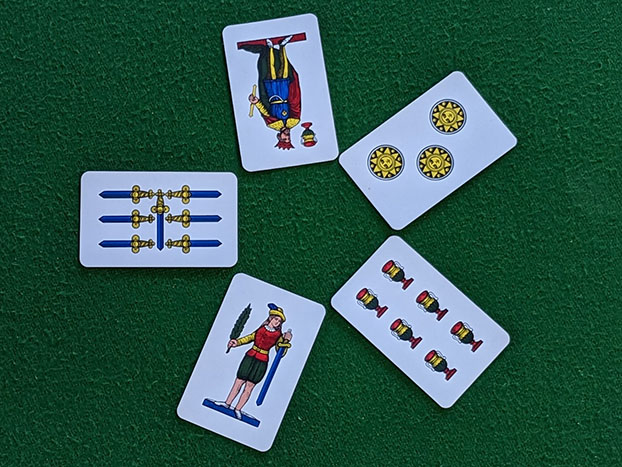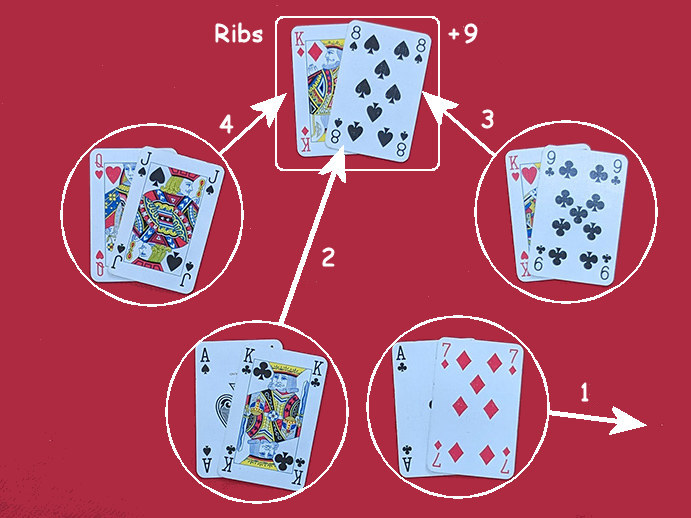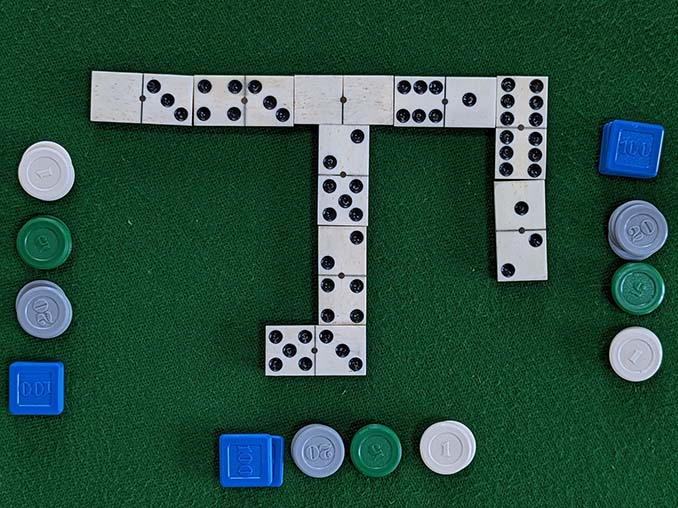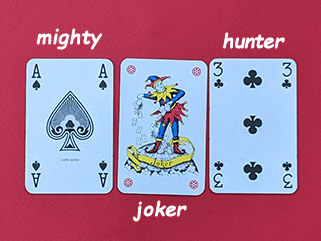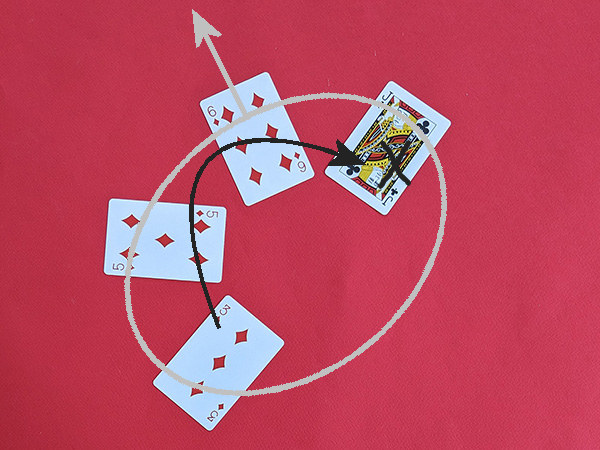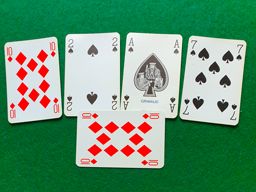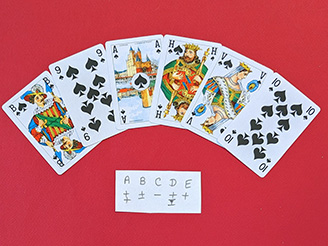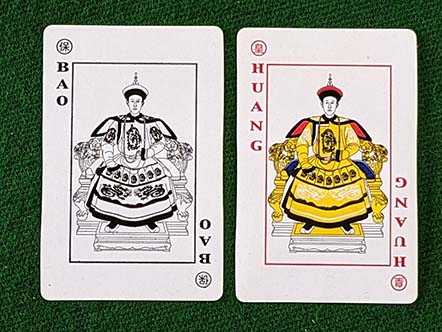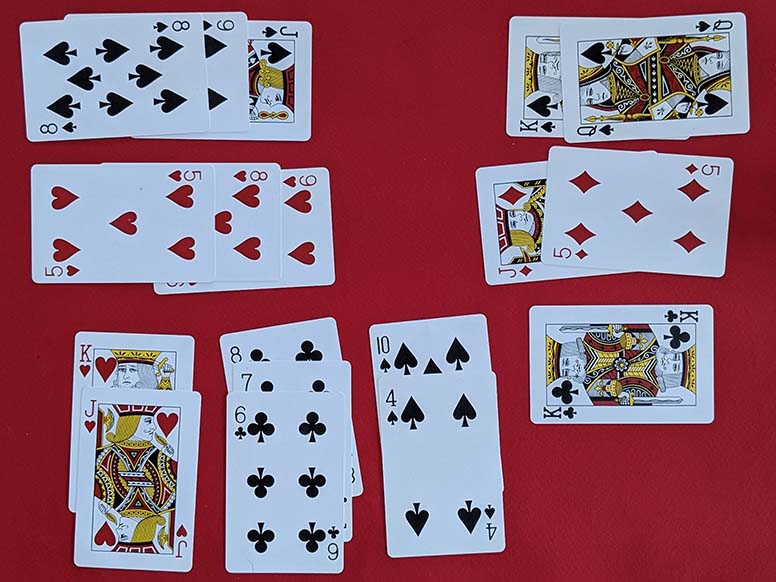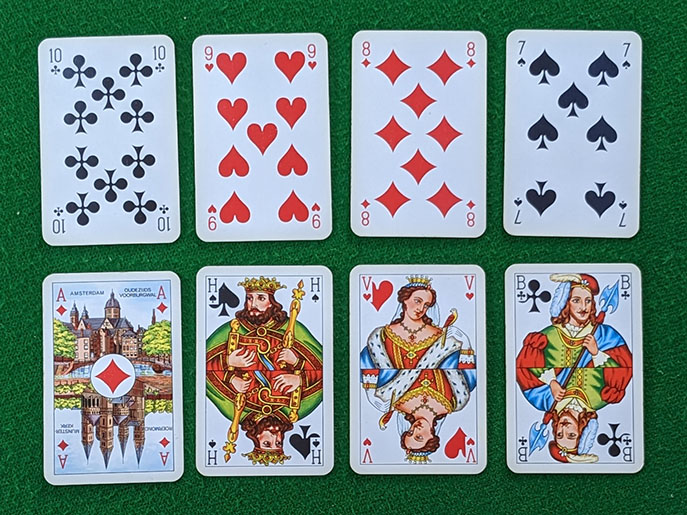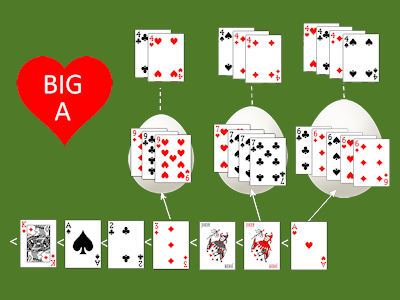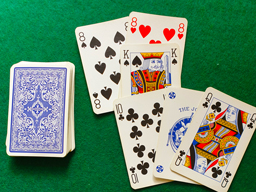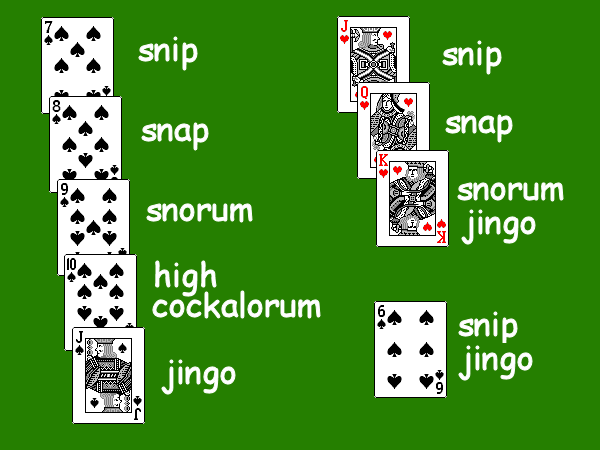Recommended Games for Five Players
A selection of some the best 5-player card games and domino games, recommended by the editor. For a longer list of traditional games, see the full 5-player game index. See also our recommended games for two, three, four and six players.
A popular and entertaining 5-player version of the well-known Italian card game Briscola, in which all the cards are dealt out. It is played in alliances of 2 against 3: the high bidder chooses trumps and selects a partner by calling a trump.
Unusual game for 4-10 players from Cleveland, Ohio in which cards are played two at a time, and before each trick players bid according to the number of points they think they can capture.
Dutch domino game for 3 to 5 players in which after the deal the loser of the previous hand chooses the rules from a large range of options: ordinary or matador matching, single line or cross, and various extra conditions can be selected.
Korean trick-taking game for 5 players, 2 against 3 with secret partnerships and some cards with special powers: the mighty, the joker and the ripper.
In this unusual Punjabi game for 4-8 players, the aim is to get rid of cards. If anyone is unable to follow suit, the 'winner' of the trick has to pick up the cards played to that trick. There is scope for skill, but it also works well for a group that includes inexperienced card players.
A Nordic game for up to 7 players in which the aim is not to win the last trick. When playing to a trick you must either overtake or play your lowest card.
This Swedish game for 2-6 players is a reverse form of Casino. There are penalty points for playing a card that captures a matching card or set of cards from the table, and a large penalty for clearing the table.
A dutch Jass game that works well for 4-6 players. If you play and win twice you are out of the game and safe. If you play and lose twice or are the last player in, you buy the drinks.
Chinese climbing game for 5 players: the emperor and eunuch play as partners against a team of 3 common people. The eunuch is the holder of a particular card whose location may be unknown to the other players until the eunuch plays it.
An original game in which players try to manage their cards, to play as many cards as possible of each suit in descending order - invented by Mitch Gunzler. See also the variation known as Mitch.
Lively game from the Netherlands, often played for drinks. There are no trumps and the aim is to win the last of four tricks, or to bet that you can win it and convince the other players to fold.
A double deck Chinese climbing card game for five players in which the holders of two identical Aces are partners against the other three players.
An unusual draw and discard game from Nepal, which has also become popular in Israel. Players get rid of their cards by discarding rummy-like combinations which they have collected.
Traditional round game for 4-8 players in which players try to get rid of their cards by playing them in ascending sequences of up to 5 cards in suit. There is a second version in which equal ranked cards are played.
The above are the editor's recommendations, but tastes differ and you may find other games you like more in the full index of traditional 5-player games. Further 5-player games can be found among the collection of invented games and on the commercial games page.
Explanation of symbols
Difficulty. Subjective assessment of the editor combining two factors: how difficult or complex the rules are, and how difficult it is to learn to play the game well.
Popularity. Games are ranked in order of the average number of people (actually different IP addresses) per month who visited the game rules page in the last 6 months. Top 10% get 5 hearts, next 10% 4 hearts, next 20% 3 hearts, next 30% 2 hearts, bottom 30% 1 heart. (The top 6 games under this ranking are also listed on the home page as 'most popular games'.)
Trend. The number of visitors in the most recent month are compared with the average per month over the preceding five months, and the significance of the change is estimated using a statistical technique described here. The pages are then ranked in order from most significant increase down to most significant decrease. The top 10% are given 5 flames, the next 20% 4 flames, the middle 40% 3 flames, the next 20% 2 flames and the bottom 10% 1 flame. (The 6 games or pages with the most significant increase are also listed on the home page under 'recent interest'.)
The stats and popularity/trend ratings are updated at the beginning of each month, and the order in which the recommended games are listed on this page is shuffled randomly once a week so as not to give undue weight to any one recommendation.
Notes on five-player games
A group of five players has quite a wide choice of good card games. These fall broadly into three categories.
- Some games played between two unequal teams, usually three against two. The teams normally change from deal to deal, and are determined by bidding or by the location of certain card.
- Some are round games, also playable by more or fewer players, normally with each person playing for themselves.
- Groups should not overlook the possibility of playing a four-player game, with each player in turn sitting out, normally when it is their turn to deal. Almost any four-player game that does not have fixed partnerships is suitable for this treatment. Having a non-playing dealer often makes the game run more smoothly as the person sitting out can use the time for activities that might otherwise interrupt the game, such as bringing refreshments, checking or updating the scores, shuffling a spare deck of cards and so on. Here are some of our recommended four-player games that are suitable for this treatment:
- Doppelkopf: This popular 4-player game from north Germany is played with a double deck of 2×24 cards. The players with the queens of clubs are partners, but you only find out who your partner is during the course of the play.
- Tarokk (Hungarian): In this 4-player tarot game from Hungary partners are chosen by calling the XX and there are multiple objectives including catching the XXI and winning the last trick with the I (pagat ultimo).
- Königrufen (Tarock): Austrian Tarock game for 4 with a large choice of contracts. In some the bidder plays alone, in others the bidder chooses a partner by calling a king.
